It is new evidence of the pact that Nicolas Sarkozy's team had with the Libyan regime under Colonel Muammar Gaddafi. Archives from the former regime, gathered by an elected representative in Tripoli connected with the 2011 revolution, Samir Shegwara, show that the Sarkozy clan was willing in 2005 to help a key figure in Libya with his legal case. In that year, just a month-and-a-half after Nicolas Sarkozy's first visit to Tripoli, his close friend and personal layer Thierry Herzog himself went to the Libyan capital offering to obtain a complete “quashing” of the criminal proceedings against Colonel Myammar Gaddafi's brother-in-law and security chief Abdullah Senussi. Senussi had been jailed for life in his absence for masterminding the 1989 bombing of a French UTA airline DC10 passenger plane over Niger, in which 170 people lost their lives.

Enlargement : Illustration 1

In March this year, when he was being questioned in custody in relation to claims that his 2007 presidential campaign was funded by the Libyan regime, Nicolas Sarkozy denied having any contact with the Libyan spy chief. He said that he had been “warned” by officials at the Ministry of the Interior – where he was minister at the time - “against a meeting with Senussi, who was wanted by the international justice system”. The former president also claimed that “this man [editor's note, Senussi] tried to contact a lawyer who is close to me, namely Thierry Herzog”. But his friend had told him that it was “out of the question that he would ever be Senussi's lawyer”.
Four written accounts of Herzog's visit to Tripoli on November 26th, 2005 - three in Arabic, one in English - drawn up by Libyan lawyers have surfaced in Libya, having survived the war there. Mediapart has been able to independently establish the documents' authenticity, and has tracked down one of their authors, Libyan lawyer Azza Al-Maghur, who was involved in the meeting and who has confirmed all the details.
According to these documents, Thierry Herzog was taken to Tripoli and introduced to Libyan lawyers by a leading Parisian barrister Francis Szpiner. He was close to the then-president Jacques Chirac but more particularly Szpiner was the long-standing lawyer for the victims association SOS Attentats and the families of the victims of the 1989 UTA DC 10 bombing, and remained so until 2008. Having represented the victims' interests during the criminal trial in 1999 that convicted Senussi, in January 2004 Szpiner signed on behalf of SOS Attentats a deal with the Gaddafi Foundation which provided “ex gratia compensation” of a million euros for each family.
But in November 2005 the issue at stake was not the victims but the person responsible for the terrorist attack. According to the accounts of the meeting, Szpiner and Herzog made an “offer” to the Libyans following “political contacts between Libyan and French leaders to resolve (this) blocked affair between the two states”. It was pointed out that the criminal conviction in 1999 prevented Abdullah Senussi from travelling “to any European country”. The lawyers proposed the “quashing” of the criminal court's verdict, as well as the international arrest warrant against the Libyan, and the opening of a new investigation which this time would spare Senussi from conviction.
“The two lawyers basically relied on the subordination of the public prosecutor to the executive machinery of the state, and consequently the influence of political relationships,” one of the accounts of the meeting states (see below).

Enlargement : Illustration 2
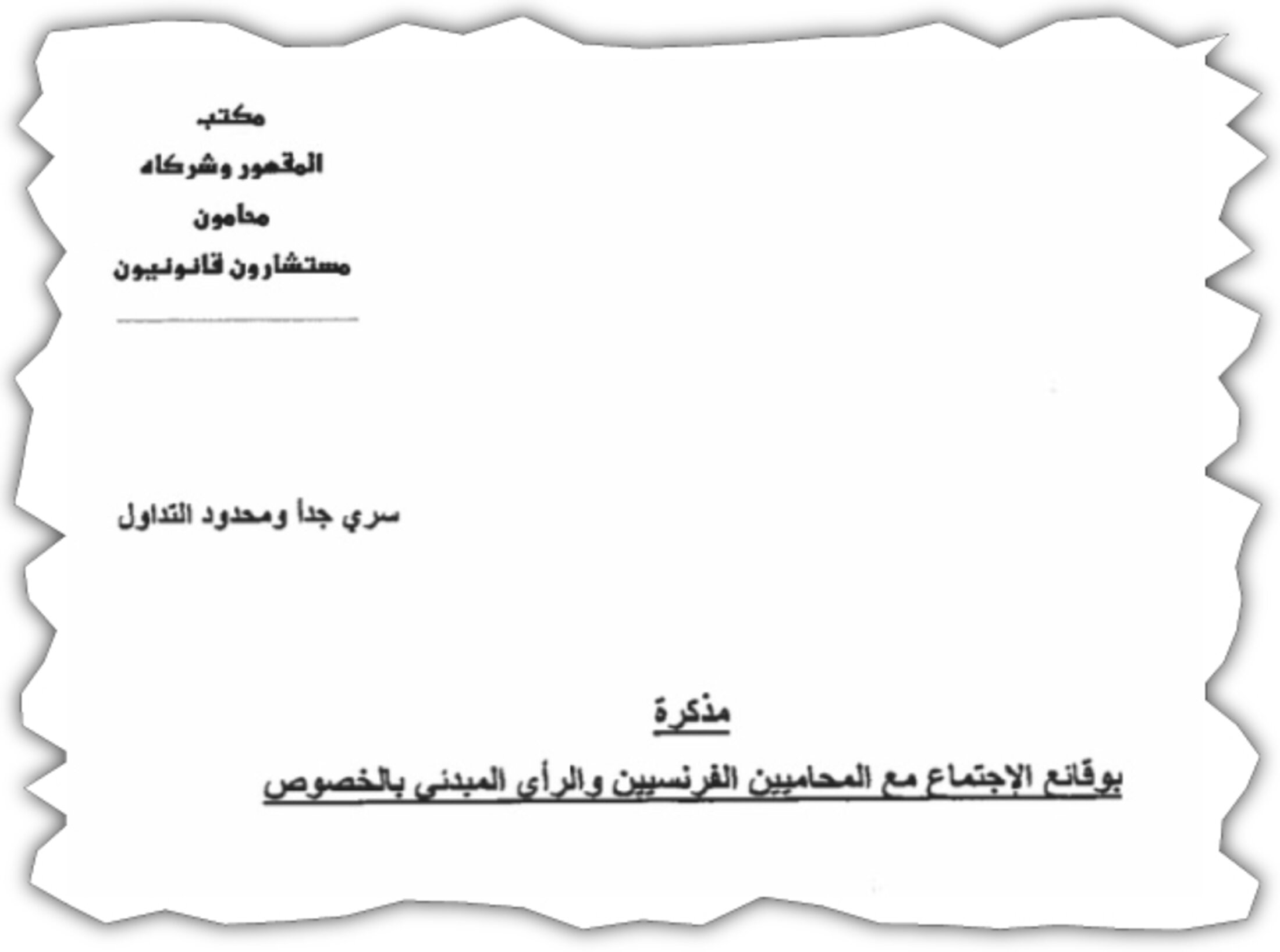

Enlargement : Illustration 3
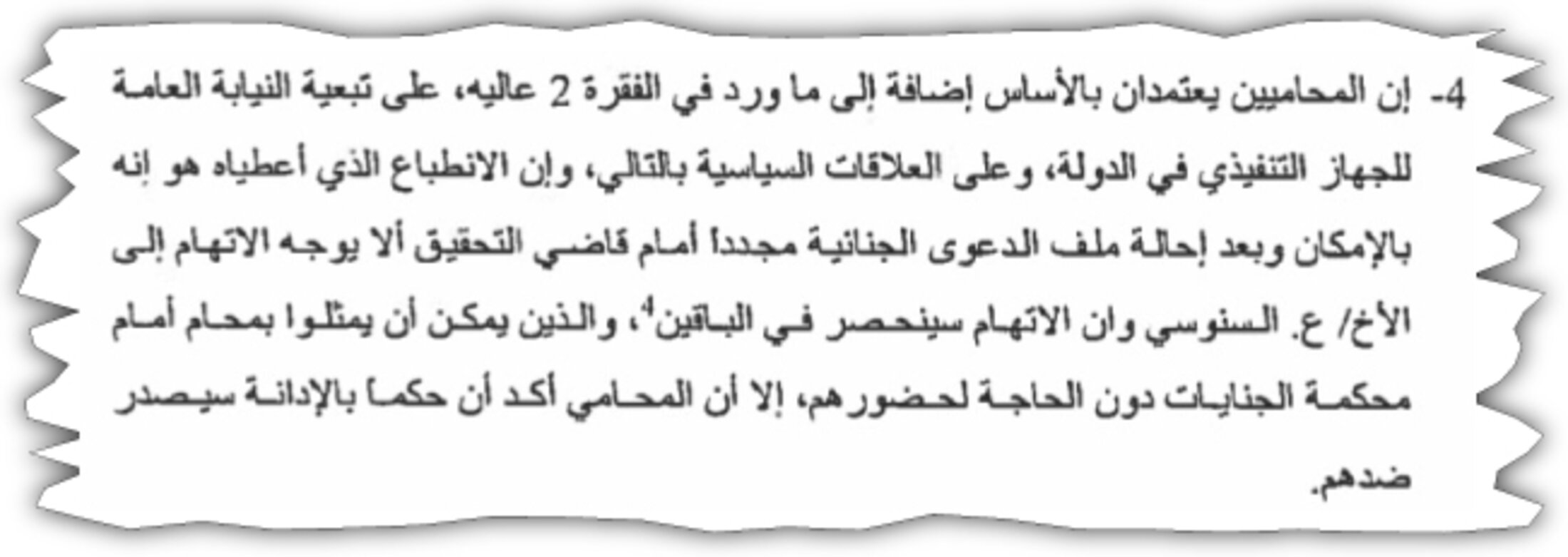
Mentioned by several witnesses, this assurance about changing Senussi's criminal status could, according to the French judges investigating the Libyan funding claims, be one of the promises made by the Sarkozy team to the Gaddafi regime that paved the way for Libyan support in the 2007 presidential campaign.
The judge-led investigation has already shown that Abdullah Senussi had secretly met Sarkozy's two key allies, chief of staff Claude Guéant and Brice Hortefeux in October and December 2005 respectively. The former spy chief has also himself confessed to judges, first in 2012 and more recently in 2017, that he ordered the payment of seven million euros to the then-minister of the interior's presidential campaign in 2007. This has also been acknowledged by the man suspected of carrying the suitcases of cash between Tripoli and Paris, middleman Ziad Takieddine.
“This Mr Senussi tried by every means to benefit from the skilled services of Thierry Herzog who, independent of his very great abilities, is close to me, going as far as sending him an authorization of representation in 2008 [editor's note, in fact in 2006],” Nicolas Sarkozy insisted when he was questioned on March 21st, 2018. “This authorisation was thrown into the bin by Mr Herzog, who refused to carry out the slighted step or consultation for him.”
Herzog, who was with the former president during his two days of questioning, has himself been sent for trial, along with Sarkozy, for alleged “corruption” of a senior judge and “influence peddling” in the case involving phone taps and the fallout from the Bettencourt affair. The investigation into Libyan funding had already unearthed an authorisation drawn up by Abdullah Senussi for Herzog and kept by Ziad Takieddine, as well as an email from a Libyan lawyer mentioning a meeting with Sarkozy's lawyer. But Herzog had denied taking any steps to help the Libyan figure.
A trip to Tripoli, a political demand
On November 26th, 2005, the two French lawyers were met in Tripoli by a team of Libyan lawyers: Hassan Qantari, Dr Abderrahman Aboutouta and Azza Al-Maghur. According to the written accounts of this meeting, Francis Szpiner mentioned from the outset the ethical problem posed by his presence. Immediately after mentioning the “political contacts” between French and Libyan leaders that were behind his and Thierry Herzog's visit, Szpiner noted that “he could not personally take charge of this affair having been part of the proceedings in his position as representative of the victims' families”.

Enlargement : Illustration 4
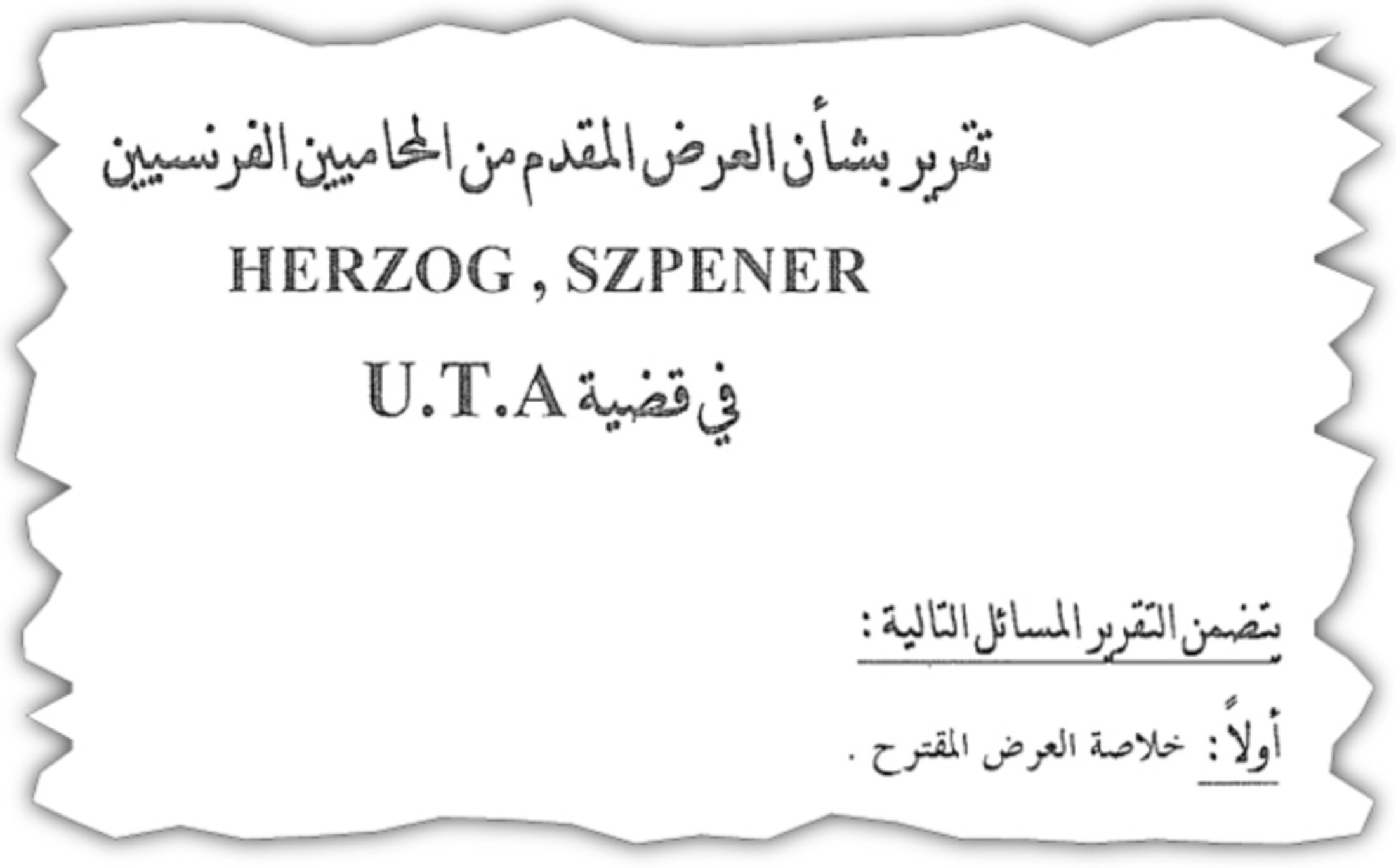
“However, he showed his enthusiasm for putting an end to this affair, he introduced his colleague the lawyer Herzog to undertake this task because of an ethical impediment, he enjoys a close relationship with the Élysée (the French president),” states the written account of the meeting made by Dr Abderrahman Aboutouta.
According to a second account of the meeting, Szpiner introduced Herzog as a lawyer “close to him” who is “going to cooperate with him to defend the six Libyan citizens” convicted in this affair. He also explained that his colleague – Herzog – was a “specialist in quashing judicial proceedings” and that “Herzog had already worked on the affair involving the wife of the former mayor of Paris [editor's note, Jean Tiberi], and according to him, Herzog had succeeded in burying it”.
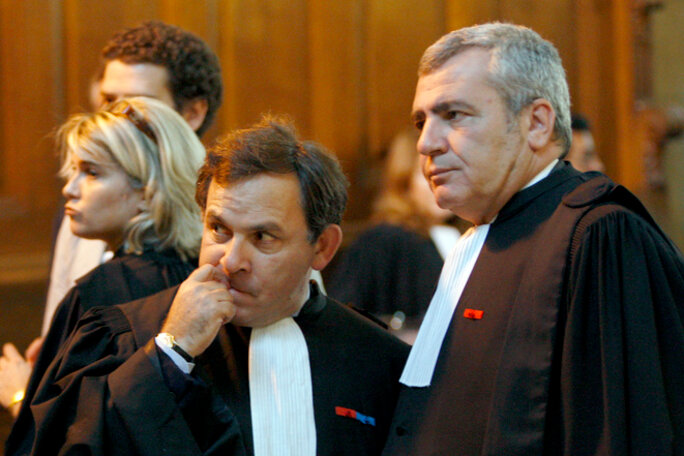
Enlargement : Illustration 5

In the French lawyer's view a “political dynamic” was needed “more than a legal dynamic”, which would oblige them to “work on the case in conjunction with the French political scene”. According to the written account, Francis Szpiner suggested removing Libya's lawyer in France, François Gibault. The agreement that would be reached “between the two parties” would be be done so “in a context which is not that of the law”, the Parisian lawyer said.
When on January 2nd, 2017, Abdullah Senussi responded to questions from a Libyan prosecutor about the steps that he expected would be taken on his behalf, he explained how Sarkozy's chief of staff at the time, Claude Guéant, had given him a document. “A document from the French government according to which they were going to send the French president's lawyer in order to give him the authority to defend me in the UTA affair and to get the accusations against me dropped, on the grounds that they found no proof against me,” he said.
Gaddafi's brother-in-law also mentioned Herzog's visit. “The lawyer actually came to Libya accompanied by colleagues on board a private plane, and they talked with the president of the supreme court Abderrahman Aboutouta and other people, among them the lawyer Azza al-Maghur. I gave my authority to this lawyer and I don't know what became of it.”
- Legal arguments and the lawyers' “ambiguity”
Of the two French lawyers, it was Francis Szpiner who had been familiar with the case since the beginning. Not only did he help the victims' families during the 1999 criminal trial, the association he represented also asked him to lodge a complaint against Gaddafi in 2001. Then in 2003 he was involved in the negotiations undertaken by representatives of the families of the UTA DC 10 victims.
As part of this move, and authorised by President Jacques Churac, the lawyer secretly met Gaddafi's son, Saif al-Islam Gaddafi, in August 2003. Then, on behalf of SOS Attentats, he signed the agreement approving new compensation in January 2004. So this Franco-Libyan affair held no secrets for him. It was also he who spoke most during the 2005 meeting.
The French lawyers first of all asked the team of Libyan lawyers to check with the six convicted Libyans if they had been properly informed of the proceedings against them. In particular they wanted to know if the six had “received personally or by diplomatic route” the notification of their convictions and the arrest warrants that resulted from them.
They wanted Abdullah Senussi and two of the others convicted to produce official mandates for Thierry Herzog so that “he can take the legal measures that he reserves the right not to reveal and which he will not divulge” in order to quash the arrest warrants and the conviction.
“The case is going to be sent again before the investigating judge and according to the lawyer the judge will only issue an arrest warrant if the public prosecutor requests it,” says the account of the meeting. “The lawyer assumes that our brother A. Senussi will not be charged because he represents the weak link in the indictment. On the other hand, the lawyer Szpiner considers that four or five of those convicted will be sent to the criminal court and that they will once again be convicted by the Criminal Court.” The French lawyers explained the advantage in this respect of the 'Perben 2' law which changed the rules of procedure on contempt of court and allowed those who had been convicted to be retried and represented by lawyers without having to appear themselves.
“Thus the solution rests in the chance of removing brother A. Senussi from the indictment during these new investigation proceedings,” says the Libyan account of the meeting. On this issue “the two lawyers basically relied on the subordination of the public prosecutor to the executive machinery of the state, and consequently the influence of political relationships,” the account says.
“The lawyer did not discount the possibility that new arrest warrants might be issued, after the criminal file is sent once again to the investigating judge, but he once again relies on political reasons which could slow or stop the issue of the arrest warrants, and which according to him are only issued at the request of the prosecution to the investigating judge,” says the Libyan report.
In his opinion on the French proposal, Dr Abderrahman Aboutouta expressed some doubts. “There is ambiguity in the method for accomplishing the quashing, for despite the questions posed to the lawyer, he didn't give answers and he merely said that they are the secrets of the trade and that he is a specialist in annulments,” he wrote. But the Libyan pointed out that there was “no risk in agreeing” and that if the French lawyer managed to quash the current proceedings and conviction, he could “take care of the new proceedings”.
In her conclusion, Azza al-Maghur thought it necessary to ask Thierry Herzog for “a written legal opinion” so he could explain the proceedings that he planned to carry out, and prove the worth of his strategy.
- The “proposal” was followed by actions
We do not know if such advice was ever written by the French lawyer in the end, but the fact that a year later on July 6th, 2006, Abdullah Senussi signed an official authorization for Thierry Herzog suggests that some secret work was indeed carried out on behalf of the main figure convicted over the 1989 DC 10 attack.
Ziad Takieddine's archives, today in the hands of investigators, have also revealed a trace of such work. Dated June 2008 a “Note on Abdullah Senussi's situation” indicated that another lawyer, Philippe Dehapiot, who is close to Francis Szpiner and Thierry Herzog, had “made contact with a lawyer at the State Council [editor's note, the top administrative body] and the Cour de Cassation [editor's note, the top appeal court] to start an “appeal” via an authorised representative to “[get] the criminal court's verdict overturned without him having to return personally to France”.
It continued: “Two grounds for overturning [the verdict] exist, the first is that the court's decision was not notified to Abdullah Senussi, the second is that this decision was not notified to the prosecution either, which is the rule when the convicted's address is unknown.”
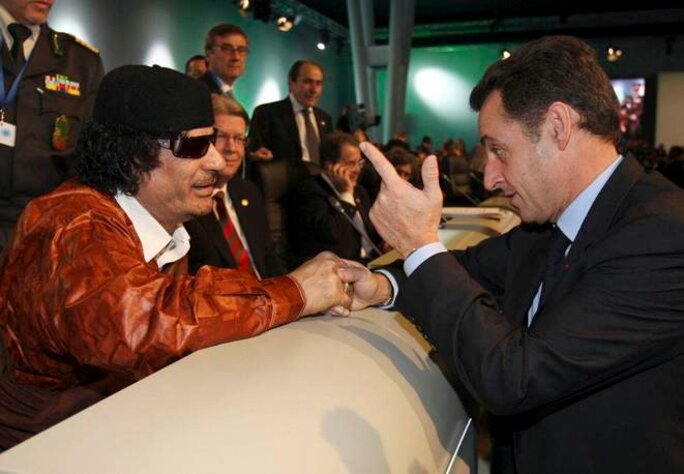
Enlargement : Illustration 6

Questioned by Mediapart, Philippe Dehapiot said he had been approached by a “private individual” who had “not followed it up”.
In May 2009, another note reports on a meeting with Claude Guéant, which gave “Mr Thierry Herzog's conclusions”. These were that “the only effective, rapid and possible step, after the agreement of CG” was to ask the public prosecutor to “send Abdullah Senussi's case” and to “set aside the arrest warrant, in view of Senussi's state of health, and his need to get urgent treatment in France”, says the document which is now in the hands of the police.
Thierry Herzog was contacted on several occasions but made no comment.
Francis Szpiner told Mediapart that he did not take part in the trip to Libya in November 2005. “It's completely false,” he said. He said he had met lawyers from the Maghur law practice but only before 1999 and the court's verdict which convicted Senussi. “I knew that this practice had asked Thierry Herzog for a consultation but I was never with Thierry Herzog at the Maghur practice,” he said. “I filed a complaint against Gaddafi. To come and explain that I wanted to sort out the affair makes no sense,” he said.
-------------------------------------------------------------------------
If you have information of public interest you would like to pass on to Mediapart for investigation you can contact us at this email address: enquete@mediapart.fr. If you wish to send us documents for our scrutiny via our highly secure platform please go to https://www.frenchleaks.fr/ which is presented in both English and French.
----------------------------------------------------------------------
- The French version of this article can be found here.
English version by Michael Streeter



